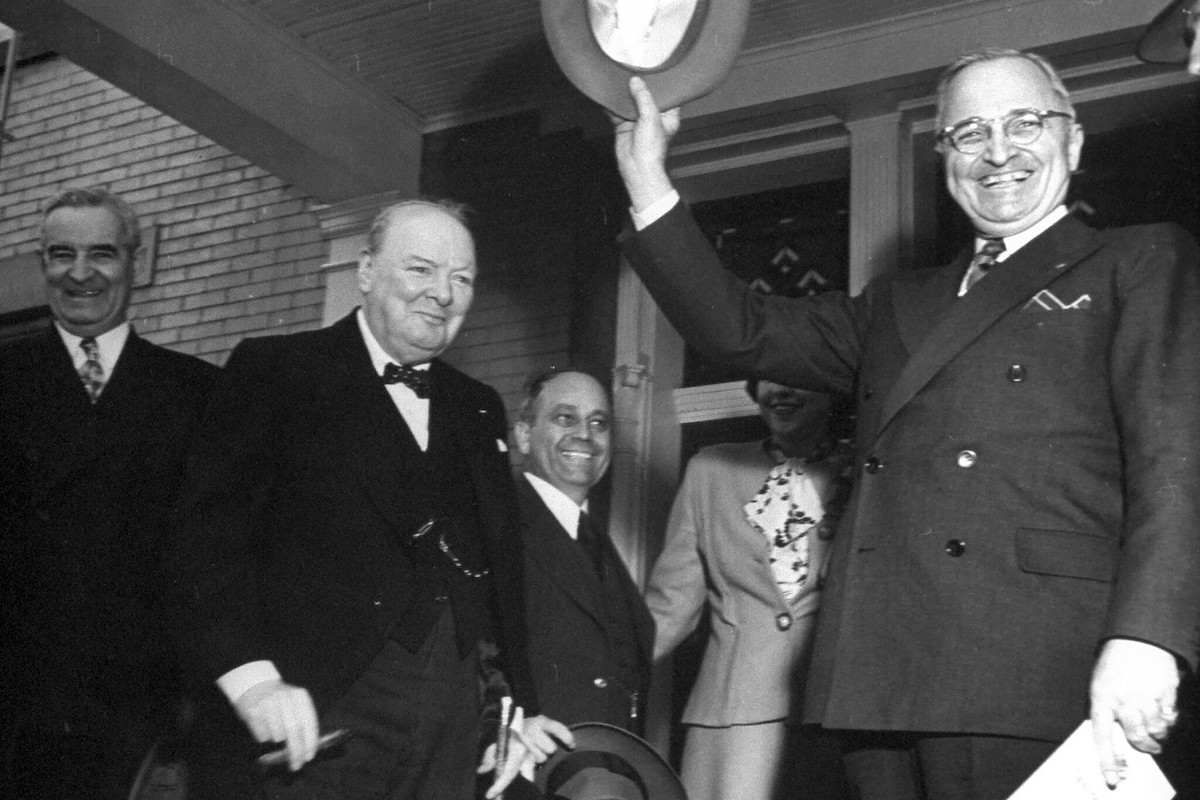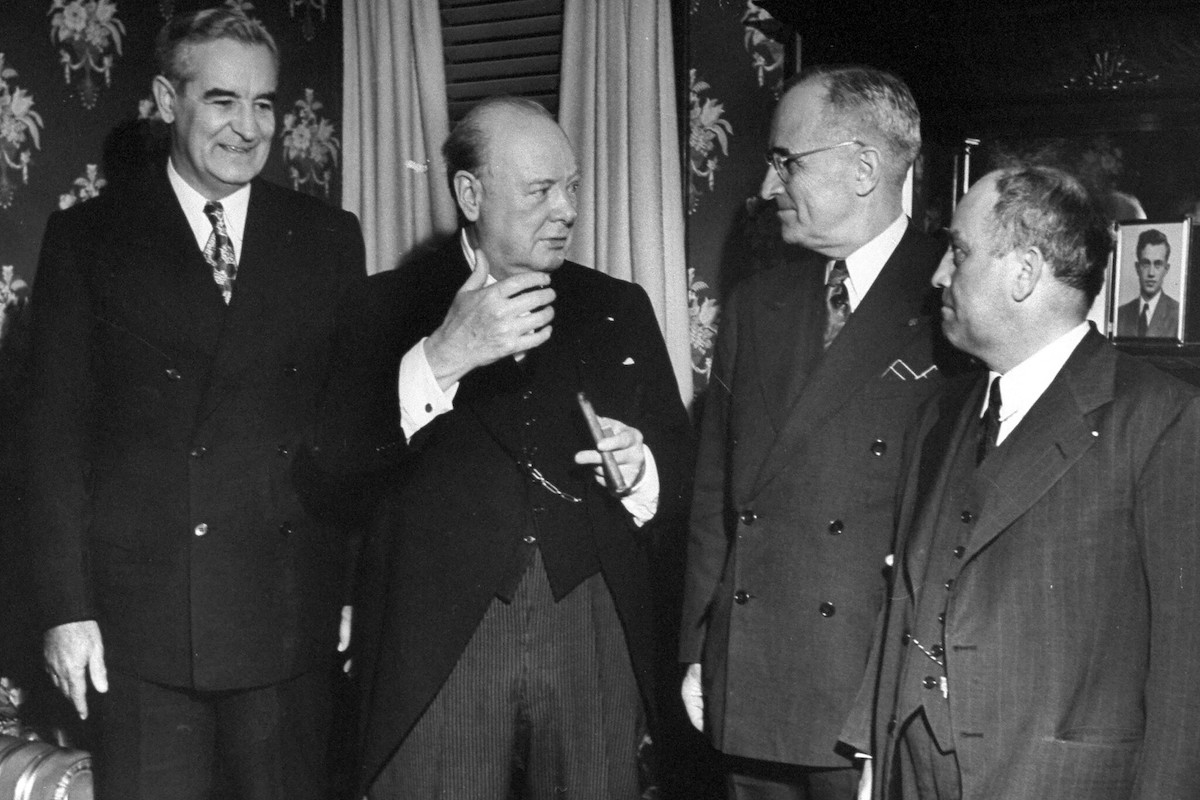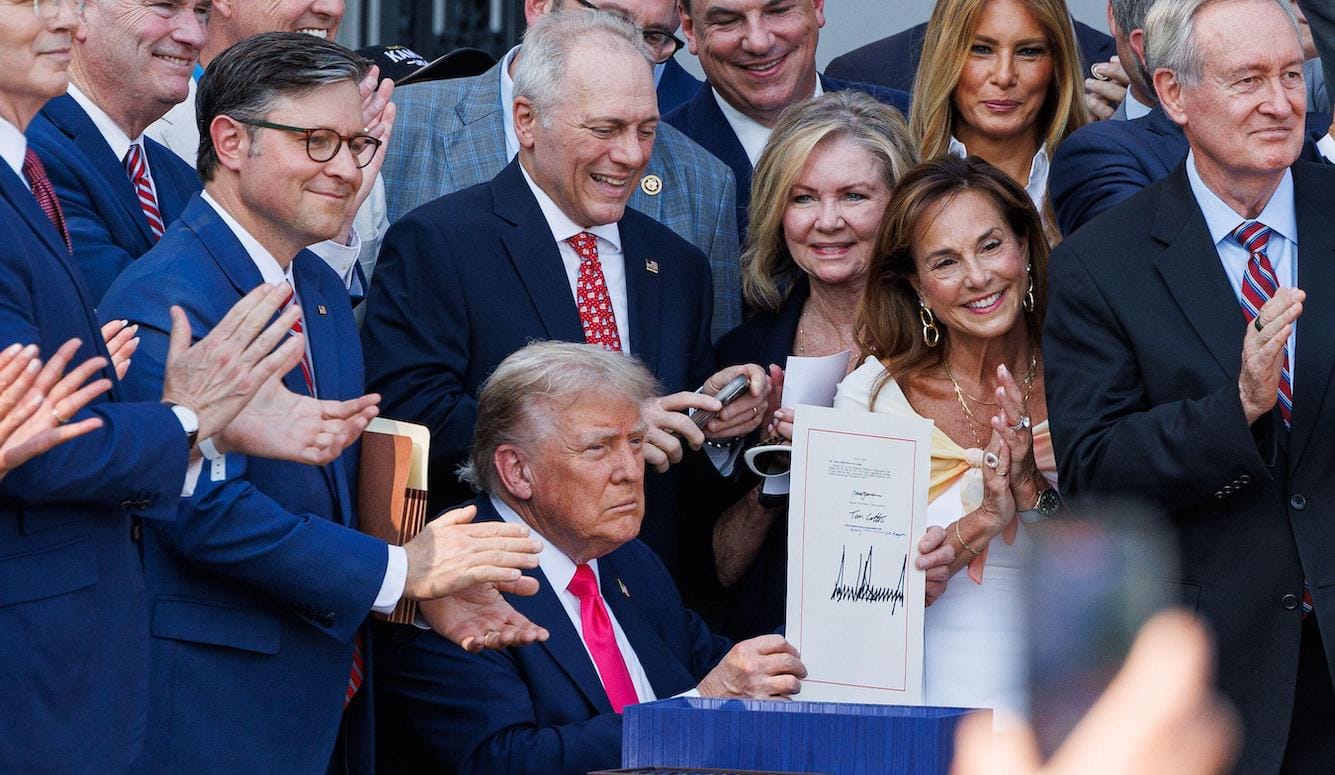History
Fulton and the Case Against Normalcy
A long-ago speech by a foreign dignitary may hold the key to recovering some lost wisdom about how America came into this role in the first place.

Whether they know it or not, Americans are in trouble. The world order from which they have drawn immense benefits—an order they once led the way in creating and for which they have borne the greatest burdens over three-quarters of a century—is at risk. Since Americans generally misunderstand their role in the world, the United States has developed an unfortunate habit of performing that role fitfully and poorly. A more mature understanding of their unique position and exceptional role in world affairs is required for Americans to better protect their interests and avert disaster in a dangerous world.
A long-ago speech by a foreign dignitary may hold the key to recovering some lost wisdom about how America came into this role in the first place. Seventy-five years ago this month, Winston Churchill traveled to the American Midwest to deliver what he believed to be the most important speech of his career. At an obscure college in Fulton, Missouri, Churchill set himself two stark objectives: one general and the other specific.
The general aim of “The Sinews of Peace,” as the speech was called, was to help American internationalists resist domestic pressure that had been building since V-J (Victory over Japan) day for the United States to “bring the boys home.” There was a widespread desire to retrench and retreat from the world after the hefty—and historically unprecedented—exertions of World War Two. Isolationism has never sat easily with America’s national character, with its inveterate commercialism and intermittent idealism, but a marked provincialism animated the view that America could safely withdraw behind the seas. This continental school of thought was convinced that America could survive—thrive, even—in the world without being deeply involved in or convulsed by its problems, agonies, and causes. This sharply limited view of America’s place in the world had been temporarily displaced by Pearl Harbor but not remotely banished. By March 1947 it was returning to the fore.
And so Churchill ventured to President Truman’s home state to pour scorn on the conception of the United States as a normal country that could live happily in the world without shouldering special obligations and commitments. With many foreign lands lying in ruins and struggling to rebuild—or build themselves for the first time—the United States, if it chose, could preserve freedom for itself and a great many others. But this was by no means preordained. The tumultuous and volatile global situation, Churchill observed, presented “a solemn moment” for the American regime. “With primacy in power is also joined an awe-inspiring accountability for the future.” This was a grave responsibility—”unsought but not recoiled from”—that the United States would need to bear for a very long time to come.
Churchill’s more specific and immediate aim had to do with the rapidly emerging threat that cast this responsibility in sharp relief, lending weight and point to America’s continued engagement and leadership in world affairs. The speech was the culmination of a growing sense in London and Washington—and Moscow—that Communism and democratic capitalism were not merely rival ideologies, but radically incompatible ones. The fate of freedom would suffer immeasurably if American power accommodated Soviet hegemony and its proselytizing Bolshevist creed. Freedom’s cause depended on the United States providing a bulwark against the rampant expansion of Soviet power and its absolutist methods for control and domination.
Churchill fully recognized that the message he was delivering was unwelcome for many on both sides of the Atlantic. His American audience had fresh memories of the horrors of war, even if they had been largely spared the sort of bloodletting and deprivation experienced by other Allied Powers at closer proximity to theaters of combat. What’s more, the Soviet Union had been a stalwart ally (after Operation Barbarossa, at any rate) in the titanic struggle against Hitler’s Germany, and the fierce fighting on the eastern front that had thrown back the Wehrmacht contributed mightily to the demise of the Axis. But however necessary that deal with the devil had been to deliver a lethal blow to fascism, it wasn’t a natural or permanent alliance. By 1947, that marriage of convenience had run its course, and the Soviet regime had ceased to be a comrade in arms. It now presented the principal threat to a new world order based on liberty and law.
In Europe, for its part, there was palpable reluctance to accept the rise of an American imperium. Nonetheless, the old continent was in no position to refuse Washington’s offer of material assistance, or its security armature that would prove to be the mainstay of its long-term security. This was not an idle subject. Europe had recently been released from the furies of fascism, but it was on the cusp of succumbing to an equally extreme and lethal ideology. In postwar Europe, the Communist Parties of Greece and Yugoslavia, France and Italy, were preparing to take power in their respective countries, with violence if necessary. Free elections in 1946 brought the Communist Party to power in Czechoslovakia. If one could fall, it was feared, all would fall, and in any case, the Soviet bloc seemed to be a permanent feature on the map. In the speech’s most arresting phrase, Churchill likened the Soviet Union’s growing influence after the end of the Second World War to an “iron curtain” descending across Europe.
In such an “anxious and baffling” time, Churchill declared, “our supreme task” was to protect civilization from its potent and determined enemies without precipitating a Third World War. In this view, the twin dangers were “two giant marauders, war and tyranny.” The former prime minister sought to alert the world to the gathering danger of Communist tyranny, and to arrange a pushback from the free world to contain and eventually overcome it. If the United States did not act with urgency to deter aggression and shore up free institutions around the world, it would belatedly realize that its own way of life was under threat from a great totalitarian foe. Appeasement was no guarantee of peace since the US might sooner or later be provoked into a panicked response under much less advantageous circumstances, leading to the outbreak of a truly catastrophic war.

It would be fair to say that Churchill’s theme in Fulton was peace, but it was peace of a particular sort; he had no use for a transient peace, nor for one that would help usher in a Soviet-dominated world order. He aspired that “the high-roads of the future” would be cleared, “not only for us but for all, not only for our time, but for a century to come.” In view of the growing scale of Soviet power and ambition, it was plain that a balance of power in service of freedom could only be built and maintained with the vast might and sustained commitment from the world’s pre-eminent liberal power. This was not an invitation for the United States to wield power arbitrarily or promiscuously, but rather to summon its “sedate and sober strength” to improve the lot of mankind.
The more acute danger than hubris and imperial overstretch, then as now, was for the United States to let its power atrophy, or decline to use its power at all. Its abstention from global leadership could not be ruled out. The Soviets in particular would be the first to recognize any weakness or hesitancy in filling this role. “There is nothing they admire so much as strength,” declared Churchill, “and there is nothing for which they have less respect than for weakness, especially military weakness.” The alternative to robust liberal solidarity was what he called a “quivering, precarious balance of power to offer its temptation to ambition or adventure.” If American power was permitted to diminish, or if the will to exercise it faltered for long, the freedom of every land would soon become imperiled. The result would be what President Kennedy would later call “the peace of the grave, or the security of the slave.”
Churchill’s overriding objective, then, was to persuade a reluctant American superpower to adopt and defend an indispensable role at the center of world affairs. To avoid the twin perils of a desolating global war and a monstrous global tyranny, Churchill ardently believed that the United States had no other choice but to keep watch on the walls of world freedom. To disengage from its leadership role as soon as Nazi Germany and imperial Japan no longer stalked the peace of the world was to accept the domination of untold foreign lands by a vicious and expansionist totalitarian state. If the Soviet Union was permitted to rise to mastery, the United States might find—as it did with the rise of Hitler’s Germany and Tojo’s Japan—that it was ultimately prepared to accept war rather than acquiesce to a world order shaped by a regime so manifestly hostile to American interests and American ideals. The specter of war would thus continue to hang over humanity, but the best hope of averting it was to achieve sufficient deterrence against authoritarian aggression and to burnish the credibility of the free democratic world.

This fusion of sober reason and high principle stood in marked contrast to the superfluous habit among certain anti-communists to sow panic among the American public about the Soviet menace rather than to instill a tough-minded vigilance against it. When Americans balked at supporting Greece and Turkey in early 1947, the Republican senator Arthur Vandenberg told Truman administration officials to “scare hell out of the American people.” Dean Acheson, Truman’s secretary of state, echoed this point in his memoirs when he confessed that political expediency dictated that certain facts needed to be presented in a light “clearer than truth.”
Churchill’s Iron Curtain speech was a more strenuous and superior method, invoking reasons other than fear alone as a motivation for American behavior in the world. He sought to honestly inform his audience—the American people and all the English-speaking peoples—about the world situation rather than simply terrify them about it. It was an appeal to interest, which had the additional distinction of being mingled, in Churchill’s mind, with considerations of honor.
Acknowledging that global leadership was against Americans’ wishes and traditions, Churchill nonetheless insisted that national honor and national interest rightly understood agitated against American retrenchment and retreat. Already in his lifetime, he said, “irresistible forces” had drawn America into Europe’s conflicts not once but twice. In each case, these interventions were made “in time to secure the victory of the good cause, but only after frightful slaughter and devastation had occurred.” This terrible outcome could recur with another bout of American irresponsibility, this time in the face of Russian bellicosity.
The prospect of another world war gave rise to justified fear, to be sure. Preventing another outbreak of conflict was one of many necessities dictated by interest. But the prevention of war was a necessary, not sufficient, chore of American power. It also needed to commit itself, Churchill said, to “the establishment of conditions of freedom and democracy” in a great number of foreign lands. American honor dictated this, and American interests would be imperiled if freedom’s battle was lost.
In a postwar letter to General Eisenhower, Churchill claimed there was “only one safe anchor” against the world being swept into a whirlpool of totalitarian misery and possible conflict. In Churchill’s mind, that safe anchor was Anglo-American dominance. The old lion could be forgiven for believing—more out of pride and hope than a hard-headed reckoning with the facts—that Britain would go on punching above its weight until it recovered its traditional strength. In reality, Britain was already a weary titan. The United Kingdom had spent a quarter of its national wealth in the Second World War. It was $12 billion in debt and was quickly burning through an American loan.

On February 21st, 1947, less than a year after Churchill’s Fulton address, Dean Acheson, George Marshall’s top deputy at the State Department, received an urgent message from the United Kingdom’s ambassador to the United States. It announced that “His Majesty’s Government,” as Acheson summarized the missive, rapidly needed to wind down its foreign commitments and could therefore no longer maintain the aid it had been delivering to Greece and Turkey, each of which was ripe for communist takeover.
The lonely baton of world leadership had passed into American hands, and Washington quickly started to race. What would come to be called the Truman Doctrine—”to support free people who are resisting attempted subjugation by armed minorities or by outside pressures”—became formal American policy. However, the message that this would be a permanent vocation was largely missed by the public as well as the elite. Over time, a vast majority of Americans’ attitudes toward their deep global involvement were conditioned by the anti-communist cause. As George Nash observed in The Conservative Intellectual Movement in America Since 1945, attempts at “theoretical harmony” between libertarians and social conservatives after World War Two were “immensely assisted by the cement of anti-Communism… Nearly all conservatives were bound together by consciousness of a common mortal enemy. The threat of an external foe… was an invaluable source of cohesion.” To some extent, that potent source of cohesion had bound Americans across party lines until most Democrats defected from the anti-communist struggle as the result of the war in Vietnam. The fall of the Berlin Wall almost immediately splintered the Right about America’s role in the world.
In September 1990, in an article entitled “A Normal Country in a Normal Time,” Jeane Kirkpatrick spoke for many on the Right when she argued that, with the Soviet Union collapsing, there was no longer a “pressing need for heroism and sacrifice.” The Cold War had given foreign policy “an unnatural importance” in American life. The “foreign policy elite” had grown accustomed to thinking of the United States as having “expansive, expensive, global purposes” that “transcended… apparent American interests.” It was time for the United States “to focus again on its own national interests,” by which she meant national interests as “conventionally conceived”—“to protect its territory, wealth, and access to necessary goods; to defend its nationals.” This was the “normal condition for nations.”
Who could doubt that the global role America had performed between the end of World War Two and the end of the Cold War was exceptional? The anti-exceptionalists are sometimes mistaken for realists. Of course, those who yearn for a return to normalcy are justified in believing that the United States hasn’t been behaving like a normal nation in the postwar era. And yet, the belief that it could afford to do so isn’t remotely realistic. It was and remains a species of unrivaled American innocence.






